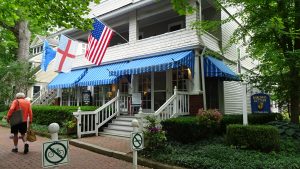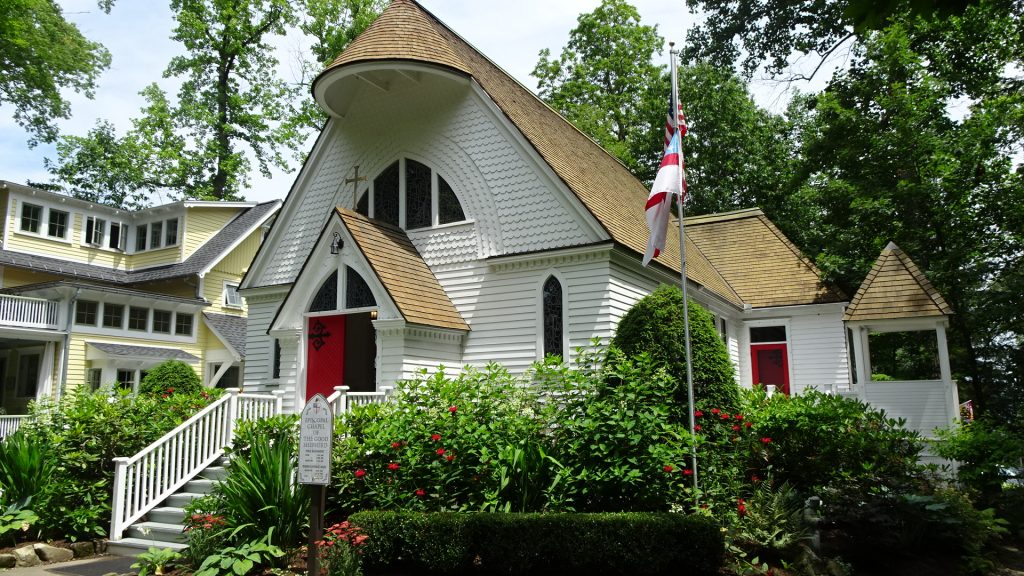
by Lee Ann Pomrenke
I had been describing the Chautauqua Institution to friends as: “NPR goes to church camp.” But perhaps the comments made by renowned Jesus scholar John Dominic Crossan before his lecture are more evocative of how those who keep returning feel about this place: “It is so good to be back in Chautauqua, where God goes on Her summer vacation.” These descriptions express well the pervading ethos and the caliber of experts in their fields who are brought as lecturers, preachers and teachers to the campus. For anyone who has always wanted to go deeper into theological study, the arts, or a certain outdoor activity, spending a week here can be like trying to drink from a fire hose.
The Chautauqua Institution began in 1874 as a two-week school for Sunday School workers on the current site along the shore of Chautauqua Lake in New York state, and offered certificates in physical education, pre-school and music education. It birthed a movement of Daughter Chautauquas and correspondence courses with reading groups, but here in New York is the mothership. Now resembling a village built around the 4 pillars of: The Arts, Religion, Education and Recreation, my family experienced Chautauqua as a place to stretch ourselves in all those areas, particularly those we do not usually exercise.
- I, a pastor and writer, took an afternoon master course with large carnivore ecologist Rae Wynn-Grant, a Fellow with the National Geographic Society, about decolonizing science and identifying the “invisible” people who make scientific study possible. This week’s lecture schedule is full of Nat Geo Fellows, all leaders in their fields of science and conservation.
- My spouse, a family medicine doc, took a finance class, a golf lesson and an adult ballet class. Next time he might learn to sail.
We both went to all the Nat Geo lectures every morning and two different operas together, two nights in a row! By the way, we all got our steps in, since cars are very restricted on the campus and most people bike or walk everywhere or take the regular, free shuttle buses.
- Our older daughter participated in the Boys and Girls Club and exercised her independence within this supportive community by walking herself all the way there on day 3. With her peers and counselors she kayaked, sailed, swam in the lake each day, played games, had zoo animals visit, and made friends, music and art. She also got to see Harry Potter and the Prisoner of Azkaban accompanied by a full symphony orchestra as one of Chautauqua’s evening concerts in the amphitheater.
- Our younger daughter’s major highlights were riding the school bus to Children’s School (9am-12 noon, for children ages 3-5), a Creative Movement class at the dance school and playing with Papa each afternoon at the beach or a playground while I attended Biblical Archaeology lectures. She got her first library card at the Chautauqua library!
We could have crafted for ourselves completely different experiences, given all the options of author talks, women clergy lunches, poetry readings, concerts and tennis tournaments that are available. Some of these things are free, but many are not, by the way. But part of the renewal and invigoration of mind, body and spirit that Chautauqua is to be about must also be rest. Some activities or events must be set aside to sit on the porch and chat with folks sharing your accommodations, wearing a t-shirt from your alma mater or whom you discover grew up in your current hometown.
 If finding Episcopal-led community and hospitality tops your priorities, you have multiple opportunities. This year marks 100 years of an Episcopal Cottage on the grounds, where guests of all faiths can rent rooms and enjoy the fellowship of a shared kitchen space. Judie Borden, the current Hostess for the cottage, advises that interested guests for next summer indicate their interest right away on October 1st, as the rooms fill quickly. The cottage is also available for retreats in the fall and spring. During the 9-week summer season, there is a different Episcopal Chaplain-in-residence each week at the Cottage, who also leads daily worship at the Chapel of the Good Shepherd within Chautauqua. Clergy who wish to apply as Chaplain for a week during the following summer will want to do so by the preceding September.
If finding Episcopal-led community and hospitality tops your priorities, you have multiple opportunities. This year marks 100 years of an Episcopal Cottage on the grounds, where guests of all faiths can rent rooms and enjoy the fellowship of a shared kitchen space. Judie Borden, the current Hostess for the cottage, advises that interested guests for next summer indicate their interest right away on October 1st, as the rooms fill quickly. The cottage is also available for retreats in the fall and spring. During the 9-week summer season, there is a different Episcopal Chaplain-in-residence each week at the Cottage, who also leads daily worship at the Chapel of the Good Shepherd within Chautauqua. Clergy who wish to apply as Chaplain for a week during the following summer will want to do so by the preceding September.
The Institution invites and celebrates preachers, authors and speakers from a range of ethnic backgrounds, and especially the arts programs (like the opera!) seem to include more people of color than the general population attending worship, lectures and classes. That general population is strikingly white and skews older, much like mainline Protestant churches. I read a book about whiteness and the Church while at Chautauqua, so I recognized quickly the advantage of generational accrued wealth, especially among the white families who have been coming here for 3 or 4 generations. African-Americans, who were systematically denied opportunities to accrue wealth through home ownership and educational opportunities, and more recent immigrants who are struggling to break into the middle class are definitely a minority in this place – although their voices and perspectives are crucial to the deep conversations engaged here. Will the themes related to race, religion and culture in this season’s final week ask self-reflective questions about Chautauqua itself? The coffee table book I saw several places calls Chautauqua a “utopia” but that begs the question: “For whom is it a utopia?”
Chautauqua is certainly a place with unprecedented access to professionals. The music and dance schools on one end of the campus are teeming with young people developing their arts under masters in their fields. Dedicated sections of the library and the bookstore put the books of guest speakers at our fingertips. The themes for high-profile speakers (such as David Brooks), nightly entertainment in the amphitheater (Diana Ross was here recently), inter-faith lectures and the preacher for the week (such as Otis Moss III or Richard Rohr) are published already for the following year so that those who only come for a week may plan which one they most want to experience. Families who have been coming here for generations may already have their own cottage or home within the grounds. For the rest of us there are cottages for rent, inns, and various denominational houses (including a Jewish house) to choose from. There are small jobs that can cover your lodging and gate passes, if that is a barrier.
It seems to take a personal invitation from someone who has been to Chautauqua to bring people here, so let me extend one: This place is for you too.
Rev. Lee Ann M. Pomrenke is a Lutheran (ELCA) pastor, writer and mother in St. Paul, Minnesota.

